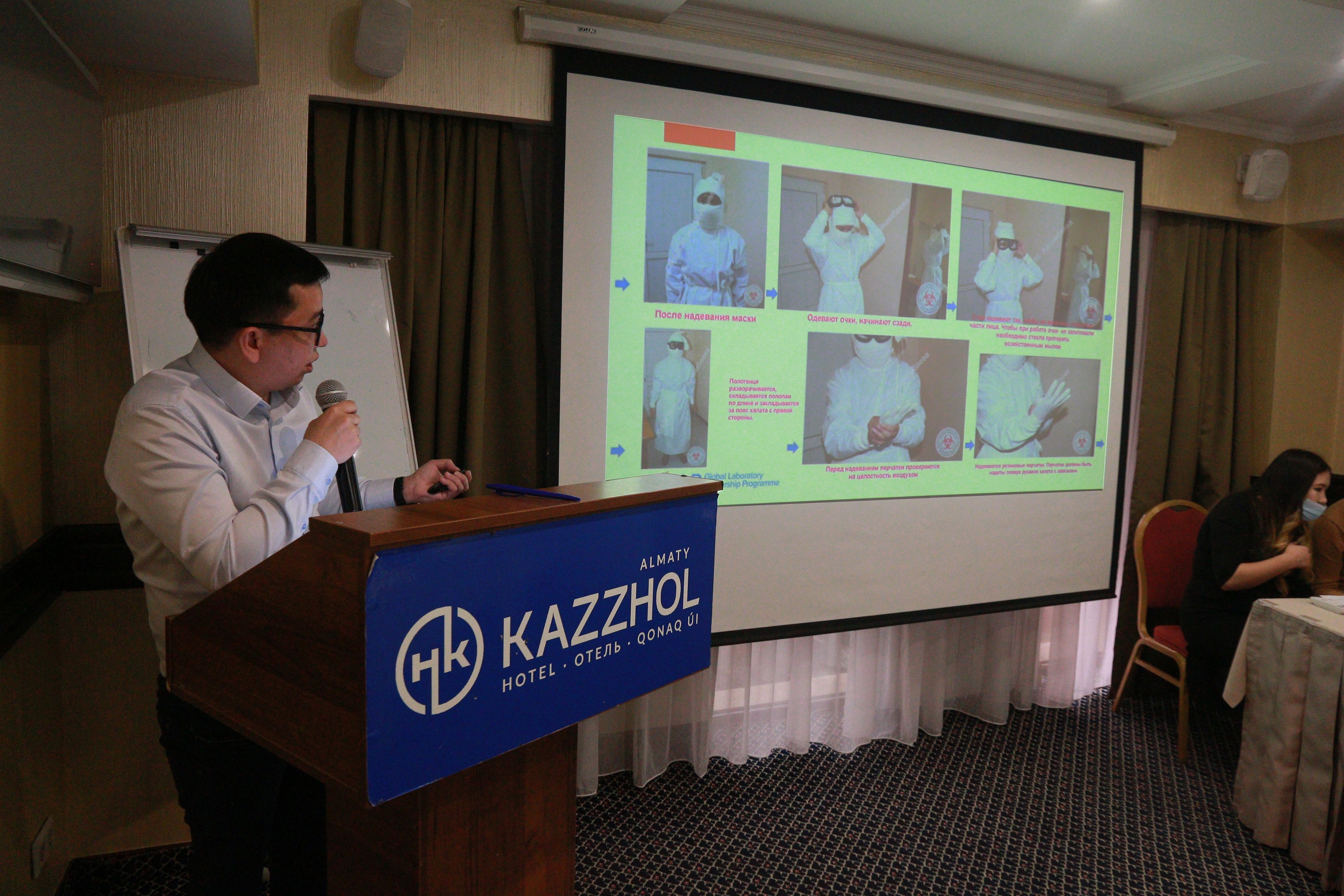Global laboratory leadership programme in Kazakhstan is building sustainable future generations of laboratory leaders
The COVID-19 pandemic has put extraordinary pressure on health services worldwide and clearly demonstrates the importance of robust laboratory systems. Developing reliable and sustainable laboratory systems necessitates strong leadership and management for which laboratory leaders need meaningful education and training. The Global Laboratory Leadership Programme (GLLP) is a multisectoral collaboration of six leading organizations [1] that operate globally to identify professionals working in human, animal, and environmental health laboratories and nurture them to become laboratory leaders. Already active in countries such as Pakistan and Burkina Faso, in 2020, under the leadership of the WHO Regional Office for Europe, the GLLP was co-funded by the European Commission’s Foreign Policy Instrument and the United States Centers for Disease Control and Prevention (CDC) for implementation in Kazakhstan, the first time the GLLP has been implemented in Central Asia.
In October 2020, the Scientific and Practical Center for Sanitary and Epidemiological Expertise and Monitoring branch of the National Center for Public Health was nominated by the Ministry of Health of the Republic of Kazakhstan to deliver the GLLP. Quality management systems and biosafety and biosecurity were selected as priority areas of focus in the first phase as they were considered the areas of highest need in Kazakhstan. The first phase of trainings was successfully completed and resulted in increased capacity in Kazakhstan for disease detection, control and prevention.
How did Kazakhstan do it, and how did the WHO Secretariat support Kazakhstan?
- By taking a One Health Approach – GLLP acknowledges the interrelatedness of human, animal, and environmental health, and follows the principles of the One Health approach in which human, animal and environmental sectors communicate and work together to improve global health security. In Kazakhstan, programme participants are selected from human and animal health sectors.
- By following a strong framework – The Laboratory Leadership Competency Framework outlines the nine essential competencies needed for leaders to build and direct sustainable laboratory systems. The framework forms the basis of the GLLP Learning Package which aims to enable any region, country, or educational institution in the world to plan, develop, implement, and evaluate a laboratory leadership programme.
By focusing on capacity building in specific areas of competence – The GLLP coaches participants in nine essential competencies needed by laboratory leaders to build and direct sustainable national laboratory systems for disease detection, control and prevention: laboratory system, leadership, management, communication, quality management system, biosafety and biosecurity, disease surveillance and outbreak investigation, emergency preparedness, response and recovery, and research. Quality management systems and biosafety and biosecurity were chosen by the Scientific and Practical Center for Sanitary and Epidemiological Expertise and Monitoring and the National Center for Public Health in Phase 1 as they were recognized as being particularly relevant for COVID-19 response efforts in Kazakhstan.

Photo Credit: © WHO / Jeremy Ford
Photo Caption: GLLP participant presenting a review of current requirements for the use of personal protective equipment in the context of COVID-19 in highly secured laboratories, Almaty, Kazakhstan, November 2021.
- By encouraging ownership at the local level – In April 2021, five national experts were selected as facilitators to train and mentor fifteen laboratory staff. Working alongside and supported by WHO, facilitators were responsible for preparing and adapting materials from the GLLP Learning Package to train and mentor participants. The approach gave significant autonomy to the facilitators, encouraging building capacity at country level, and helping to ensure sustainability.
- By delivering a recognized programme – Upon completion of Phase 1 of the programme, participants received GLLP certification plus a national registered certificate which counts towards continuous education. Phase 1 of the programme occurred between June and November 2021 and focused on quality management systems and biosafety and biosecurity. Participants completed 240 hours of face-to-face learning sessions and prepared a thesis equivalent to 720 hours of learning. Regular online meetings were held between facilitators and participants to accompany the thesis writing.
- By closely monitoring programme progress – Throughout Phase 1, facilitators provided continuous mentorship to participants and regularly met with WHO to exchange ideas and monitor programme progress.
Knowledge assessment was performed pre- and post-training, and thesis defense occurred in Almaty in November 2021 where participants were judged by a panel of the GLLP facilitators, WHO and CDC experts. The average score for thesis oral presentation was 90% (range 76% to 98%). Participants and facilitators reported high satisfaction with the programme.
With Phase 1 complete and planning well underway for Phase 2, the GLLP is clearly creating a new and sustainable generation of laboratory leaders in Kazakhstan. Phase 1 competencies, quality management systems and biosafety and biosecurity, are paramount for improving the reliability and timeliness of laboratory procedures. As Kazakhstan’s capacity to build, strengthen, and sustain national laboratory system grows, so will clinician confidence in laboratory services and the general public’s trust in the health system. Due to the project’s success, other countries have expressed strong interest in the GLLP model. Currently, 32 countries are either engaged in or discussing GLLP implementation in their own context.
[1] Association of Public Health Laboratories (APHL), Centers for Disease Control and Prevention (CDC), European Centre for Disease Prevention and Control (ECDC), Food and Agriculture Organization of the United Nations (FAO), World Organisation for Animal Health (OIE), World Health Organization (WHO)
